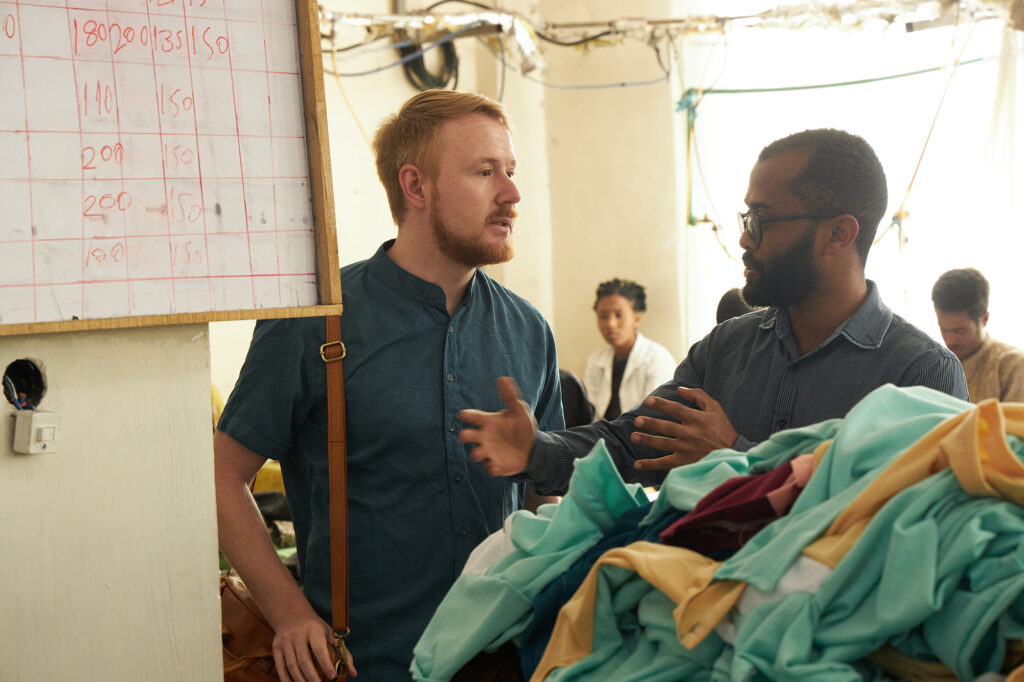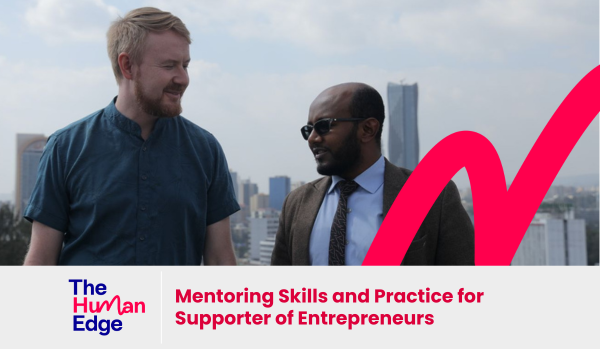For Philipp Wind, supporting small and medium-sized enterprises (SMEs) isn’t just about business growth—it’s about unlocking potential. As a Team Leader and Advisor at sequa gGmBH, a German non-profit organisation, Philipp works on SME development projects in Rwanda and Ethiopia, helping high-growth companies access technical support, funding and business coaching. The project is supported by invest for jobs, the special initiative “Decent work for a just transition” of the German federal ministry for economic cooperation and development (BMZ). The special initiative is implemented by the Deutsche Gesellschaft für Internationale Zusammenarbeit (GIZ) GmbH.
His role involves working closely with entrepreneurs, guiding them through strategy development, connecting them with the right resources and helping them navigate business challenges. But as his work deepened, Philipp recognised that: “[sequa] provided coaching and technical support, but I realised we were also engaging in mentoring—even if we didn’t call it that. I wanted to understand mentoring properly, structure it effectively and bring it into our programmes in a meaningful way.”
That’s what led him to The Human Edge’s Mentoring Skills and Practice (MSP) programme.
Coming into the programme, Philipp was particularly interested in understanding the differences between coaching and mentoring and how to structure mentoring within his organisation’s SME support initiatives. “Before the training, I wasn’t fully clear on what set mentoring apart from coaching. But I quickly realised that our work wasn’t just about technical advice—it was also about guiding entrepreneurs through decision-making, helping them build confidence and providing a trusted space to reflect on challenges.”
The course introduced him to structured frameworks like the OSCAR model, which helped him rethink how conversations with entrepreneurs could be structured for greater impact. “One of my biggest takeaways was learning how to use structured questioning techniques instead of just giving advice. I now focus more on guiding entrepreneurs to explore solutions themselves rather than jumping in with recommendations.”
Philipp quickly began applying these insights, particularly in how sequa onboards SMEs into its support programmes.
Previously, Sequa’s coaching and mentoring approach was highly data-driven, relying on assessments to identify gaps in areas like finance, HR and operations. While effective, Philipp saw an opportunity to make these engagements more entrepreneur-led. “Instead of just rating business areas and setting action plans, we’ll use mentoring techniques to structure conversations. We’ll help entrepreneurs define their own goals, reflect on their challenges and create a roadmap that they feel ownership over.”
The MSP programme also influenced how Philipp approaches hiring and managing business coaches within Sequa’s projects. He now ensures that mentors and coaches are selected not just for their expertise, but also for their ability to guide, listen and empower entrepreneurs effectively. “It’s not just about having industry experts—mentors need to know how to facilitate learning, not just provide solutions. That’s something I’m now much more intentional about in our programme design.”
On a more personal level, Philipp gained a deeper level of self-awareness—how his own communication style, assumptions and ways of working influenced his interactions, particularly in cross-cultural settings. “Working across cultures, you sometimes don’t realise how your way of communicating is being received. The training helped me step back, reflect and approach conversations more mindfully.” By becoming more aware of his own communication tendencies, he was able to adapt his approach to better engage with entrepreneurs, colleagues and partners from different backgrounds. “I became much more conscious of how I listen, how I frame questions and how I create space for others to share their perspectives.”
Looking ahead, Philipp is committed to expanding the role of mentoring in SME support. While coaching has long been a key part of Sequa’s programmes, he now sees an opportunity to build a more structured mentoring journey for entrepreneurs. Some of his considerations are:
- Integrating mentoring models – He plans to formally incorporate frameworks like the OSCAR model into sequa’s SME action planning, ensuring structured, entrepreneur-led goal setting.
- Developing a mentoring blueprint – Since sequa operates across multiple countries, he hopes to create a scalable mentoring model that can be adapted to different cultural and business contexts.
- Ensuring mentoring complements technical support – He wants to strike a balance between hard data-driven coaching and mentoring that supports personal and leadership growth. “We’ve identified strong business models, but the success of SMEs often comes down to the entrepreneur themselves—their mindset, leadership and resilience. Mentoring plays a huge role in supporting that and I want to ensure we integrate it effectively.”
Philipp would recommend the MSP programme “to anyone working with entrepreneurs. Even if you’re not formally mentoring yet, the skills you gain—self-awareness, active listening and structured questioning—are incredibly valuable.”
Beyond individual learning, he sees huge value for organisations looking to build mentoring programmes. “For organisations new to mentoring, this course provides a solid foundation. It gives you practical tools, real-world applications and a strong peer network to learn from.”
With a deeper understanding of mentorship, greater self-awareness and a commitment to fostering strong cross-cultural communication, Philipp Wind is not just supporting SMEs—he’s helping shape the future of business mentoring in Africa.

Philipp took part in the Mentoring Skills and Practice for Supporter of Entrepreneurs Programme cohort in September 2024. The programme involved 123 mentors from 16 countries across SSA and MENA. For more details on the Mentoring Skills and Practice Course, click here.

